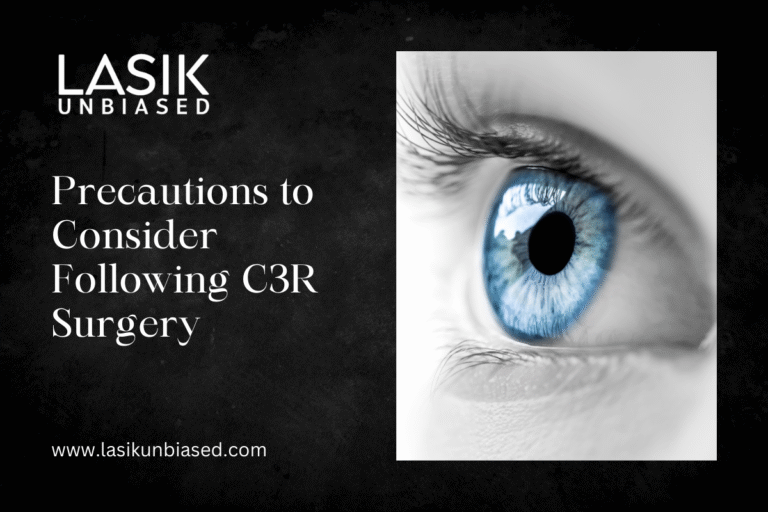After undergoing C3R (Corneal Collagen Cross-Linking) surgery for keratoconus, adhering to certain precautions is critical to ensure optimal recovery and long-term eye health.
Proper post-operative care can significantly affect the success of the procedure, minimising complications and promoting healing.
This comprehensive guide details the most important precautions to take following C3R surgery, helping patients safeguard their vision and achieve the best possible outcome.
Understanding C3R Surgery and the Importance of Precautions
Corneal Collagen Cross-Linking, or C3R, aims to halt the progression of keratoconus by strengthening the cornea. While the procedure is minimally invasive, the eye undergoes significant changes. Hence, taking proper care post-surgery is key to preventing infections, reducing discomfort, and ensuring that the treatment yields long-term benefits.
Why Precautions Are Necessary?
- Promotes Effective Healing: The cornea needs time and care to heal; failing to follow precautions may lead to delayed recovery.
- Reduced Risk of Complications: Proper aftercare minimises the chances of infections, inflammation, or damage to the treated eye.
- Prolonged Treatment Success: Following medical advice supports the treatment’s durability, enhancing the eye’s structural stability.
Key Precautions Immediately After Surgery
Avoid Touching or Rubbing the Eyes
The cornea is highly sensitive after the procedure, and touching or rubbing the eyes could disrupt the healing process. Protect your eyes by keeping your hands away and wearing protective glasses to prevent accidental contact.
Use Prescribed Medications Diligently
Follow your doctor’s instructions regarding eye drops and medications. Antibiotic drops prevent infections, while anti-inflammatory drops alleviate swelling. Do not skip doses or stop using the drops until advised by your ophthalmologist.
- Use an alarm or reminder to maintain the prescribed schedule.
- It is important to ensure your hands are thoroughly clean before applying eye drops to prevent the introduction of bacteria.
Maintain Proper Eye Hygiene
Keeping your eyes clean is vital to avoiding infections. Please adhere to the following steps for post-surgical hygiene:
- Clean the area around the eyes gently using a sterile, damp cloth.
- Avoid exposing your eyes to dust, wind, or dirt. Protective eyewear, such as wrap-around glasses, can help minimise irritants.
Protect Against UV Exposure
UV rays can harm the healing cornea. After surgery, the cornea may be more sensitive to UV rays, which can harm the healing tissue. Always wear UV-protective sunglasses when stepping outdoors and avoid prolonged sun exposure.
Lifestyle Adjustments During the Recovery Phase
Rest Your Eyes
Overexertion can hinder recovery. Give your eyes sufficient rest to recuperate faster. Avoid activities that strain your eyes, such as reading for extended periods, using digital screens excessively, or performing detailed visual tasks.
- Take regular breaks from screen time by following the 20-20-20 rule, which recommends looking at an object 20 feet away for 20 seconds every 20 minutes.
- Use dim lighting instead of harsh overhead lights.
Avoid Swimming or High-Humidity Environments
Eyes healing after C3R surgery are prone to infection from bacteria present in swimming pools or hot tubs. Refrain from swimming or exposing your eyes to steam rooms, hot showers, or saunas for at least two weeks post-surgery (or as advised by your surgeon).
Abstain from Eye Makeup
To prevent irritation or infection, steer clear of eye makeup such as mascara, eyeliner, or eyeshadow until fully healed. Wait for your ophthalmologist’s clearance before resuming the use of any cosmetics near your eyes.
Follow Dietary Guidelines For Better Healing
A nutrient-rich diet aids in tissue repair and overall eye health. Include foods rich in vitamins, antioxidants, and omega-3 fatty acids to support healing.
- Vitamins A and C (orange vegetables, citrus fruits): Boost tissue repair.
- Omega-3 Fatty Acids (fatty fish, flaxseeds): Reduce inflammation.
- Zinc (pumpkin seeds, legumes): Enhances immune response.
Stay Hydrated
Proper hydration aids in eye function and helps reduce dryness, which can be a common issue after C3R surgery. Make sure to drink plenty of water throughout the day to support your healing process.
Activities to Avoid Post-C3R Surgery
Skip Physical Activities That May Harm the Eyes
Strenuous exercise, heavy lifting, or activities prone to sudden impact should be avoided. High-intensity workouts or sports can increase strain on the corneas or risk eye injuries.
- Opt for light walking instead of intense gym workouts.
- Delay activities requiring full stamina until medically advised.
Pause Driving Until Cleared by a Doctor
Your vision may remain blurry for several days after surgery due to the healing process. To ensure safety, wait for your doctor to confirm that your eyesight has stabilised before resuming driving.
Delay Wearing Contact Lenses
Contact lenses have the potential to irritate healing corneal tissue and may result in complications. Use glasses instead and wait until your ophthalmologist clears you to resume contact lens use.
Long-Term Care for Sustained Recovery
Regular Follow-Up Appointments
Keep up with all post-operative check-ups as scheduled by your ophthalmologist. These appointments are critical for assessing your recovery progress.
- Bring a list of any concerns or discomforts you experience to these visits.
- Discuss corrective measures if there are issues with vision improvement post-surgery.
Continue UV Protection
Corneas remain sensitive to light for a prolonged period after surgery. Maintain the habit of wearing sunglasses outdoors to prevent UV-related damage long after the initial recovery phase.
Adopt a Healthy Sleep Routine
During sleep, your corneas experience natural restoration. Proper rest aids in healing and reduces eye strain. Lie on your back if possible to avoid putting pressure on the treated eye.
Common Mistakes to Avoid After C3R Surgery
Not Following Medical Advice
Skipping medications, missing follow-ups, or ignoring symptoms such as prolonged discomfort or redness can lead to complications. Always consult your ophthalmologist for advice if anything feels out of the ordinary.
Delaying Initial Precautions
Adopting precautions from the first day after surgery maximises recovery opportunities. Delaying care may compromise healing and put you at risk of infection or other issues.
Overconfidence in Recovery
While many patients notice immediate improvements after surgery, remember that the healing process is gradual. Follow all precautions steadily, even if your vision seems normal.
Caring for Your Vision Beyond Recovery
Protecting your eyes shouldn’t stop at the recovery phase. Regularly screen for changes in eyesight, follow a balanced diet, and avoid exposure to harmful environmental conditions. Eye health is pivotal to an active, fulfilling lifestyle.
Make Recovery a Top Priority
Ensuring success post-C3R surgery depends significantly on adhering to these precautions. From maintaining eye hygiene to avoiding strenuous activities, every step matters. If you’re unsure about any aspect of your recovery, consult your ophthalmologist without hesitation. Remember that proper care today leads to long-lasting benefits for your vision.


